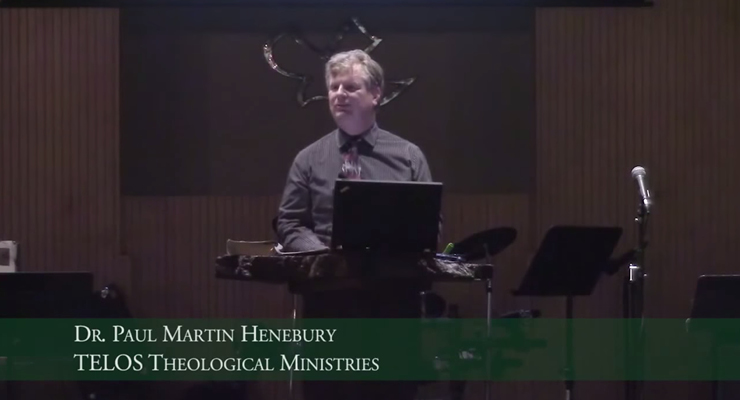Part Nine This installment may be thought of as a digression, but I think it belongs to the overall argument. Imagine a world where the removal of the saints from Planet Earth happened but no one had the foggiest idea of when that might be. If the NT alluded to such a thing there would still be some hope that we just may be the ones to get called up. The doctrine of the rapture would still be a “sure …
Category: Biblical Covenantalism
Parts Three and Four Here are the fifth and sixth videos of my TELOS Conference presentations of Biblical Covenantalism. These presentations cover the pivotal role of the Lord Jesus Christ in “the Creation Project” set out in God’s Word; especially in His Covenants: Fifth Talk: CHRIST AND THE NEW COVENANT Sixth Talk: CHRIST AND THE CONSUMMATION OF ALL THINGS I hope that these six presentations elucidate my approach more clearly for some visitors to this blog. …
Here are the third and fourth videos of my TELOS Conference presentations of Biblical Covenantalism. These presentations cover God’s Covenants: Third Talk: THE COVENANTS OF GOD Fourth Talk: CHRIST AND THE COVENANTS Parts One and Two are here. …
Here are the first two videos of my TELOS Conference presentations of Biblical Covenantalism. These presentations cover the topics of Hermeneutics and Creation. First Talk: CHRIST and INTERPRETATION Second Talk: CHRIST and CREATION These video presentations give a detailed overview of Biblical Covenantalism and the exalted place it gives to the Lord Jesus Christ; a place which is not artificially read onto the pages of the Bible, but which comes clearly from its plain wording – especially from the words …
Part Eight Israel means Israel I am a pretribulationist. I think my main reasons for being so are theological, in particular the covenantal issues concerning the nation of Israel are a central concern to me. But I am not pretribulational because I adopt a form of theological hermeneutics (now so fashionable in some quarters). I have already made it clear that rapture scenarios cannot (in my opinion) rise above a “best explanation” conclusion. That is equivalent to a C3 in …
Part Seven The Church in the Seventieth Week? Of the several options on the timing of the rapture only the pretribulational view keeps the Body of Christ entirely out of the Seventieth Week of Daniel 9. But that fact says little if in fact the Church is said in Scripture to go through some or all of it. To my mind, it is no good trying to place the Body of Christ in the Seventieth Week unless there are solid …
Part Six So far I have tried to establish these important factors in determining the timing of the rapture of the Church. I fully realize that each of these points could be studied in more depth, but for my purposes I think the coverage is satisfactory. The factors are these: 1. The time of the rapture is exegetically indeterminable 2. Hence, if it is to be known it must be deduced 3. As such the timing of this event can …
Part Five This series explores the various avenues which have to be gone down in order to get the doctrine of the Rapture of the Church right. I am deliberately avoiding the more conventional comparative approach. This may annoy some and intrigue others. I hope the former group is smaller than the latter! The Day of the Lord, Cosmic Upheavals, and the Return of Christ The concept of the Day of the Lord describes different yet related things. If …
Part Four In this piece I want to go behind the subject of the rapture so as to approach it from another angle. Please bear with me. The Book of Revelation has been the subject of varied interpretations. Since the Greek word apocalypsis means “a disclosure” or “unveiling” the different interpretative approaches to the Book is quite ironic if not a little embarrassing. The opening verses of Revelation inform us that it concerns “things which must shortly take place” (1:1; …
Part Three So far I have tried to establish a base in biblical texts for my further inquiry into the rapture. Remember, I write as a non-too-dogmatic pre-tribber whose interest in these posts is to think through the various approaches. Few Major Rapture Passages All proponents of the rapture must acknowledge that there are very few direct references to the catching up of the saints. Without 1 Cor. 15 and Jn. 14, perhaps Matt. 24, but especially 1 Thess. 4, …




